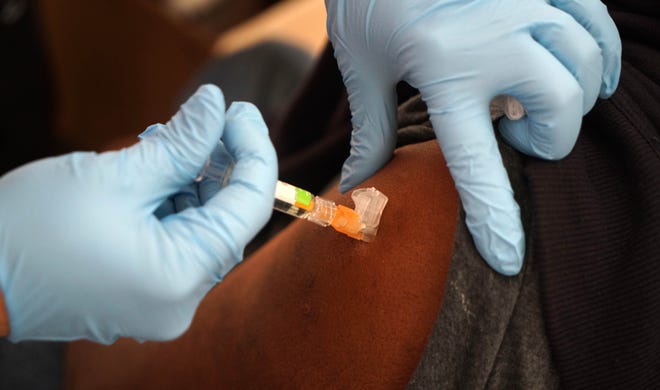This story has been updated to reflect that Delaware has confirmed only one flu case for the 2022-2023 flu season. Delaware health officials originally stated that there were two cases, but later corrected that number. The second case was confirmed before the current flu season began.
A few days into the 2022-2023 flu season, Delaware sees its first flu case in what is expected to be a rampant period for flu transmission.
Oct. 2 marked the official start of the latest influenza season, and the Delaware Division of Public Health released details on Wednesday on the first confirmed case.
The first case occurred in Kent County with a 32-year-old woman who was vaccinated and contracted the A strain of influenza.
This case comes about one week after the state alerted the public to the severity of the flu and stressed the importance of getting vaccinated.
“Announcing our first case of the flu, just days after the start of the season, is a strong indicator for Delawareans to get their flu vaccines as soon as possible,” said Interim Public Health Director Dr. Rick Hong in a statement. “The flu is a threat to our health, and getting the vaccine is the best way to protect yourself from either getting it, or at the very least reducing the severity of symptoms and illness if you do get it.”
When is flu season and how long does it last?
While the flu is detected year-round in the United States, the viruses typically circulate during the fall and winter.
The exact duration of flu season varies but flu activity is known to increase in October and peak between December and February. The flu can also last as late as May, according to the CDC.
Since the start of the COVID-19 pandemic, the timeline of flu season, along with flu activity, has been less predictable than in years past.
Delaware’s flu data and what to expect this flu season
During the 2021-2022 flu season, Delaware reported more than 2,700 lab-confirmed flu cases.
Over 150 individuals were hospitalized due to the flu and three people died from flu complications, according to state public health.
Recent data suggest that these numbers stand to increase with the start of this year’s flu season in the U.S.
The Southern Hemisphere, which experiences flu season from May to September and serves as a preview for what the U.S. could experience, had flu cases reach pre-pandemic levels this summer.

By mid-July of 2021, Australia reported about 400 cases of the flu, with no hospitalizations or deaths, similar to the low flu transmission seen in the U.S in recent years.
This summer, nearly 205,000 cases were reported in Australia by mid-July, with 1,500 hospitalizations and 181 deaths.
These numbers exceeded pre-pandemic flu activity from 2019, when about 150,000 cases were reported by mid-July in Australia.
More:Flu may be coming back with a vengeance, experts say, and children could be at risk
Who can get vaccinated
The flu vaccine is recommended for anyone six months old and up and is safe to be administered at the same time as the COVID-19 vaccine.
COVID in Delaware:Delaware masking guidance changes as all three counties have ‘high’ spread of COVID
Who is at risk
During normal flu season activity, children younger than two and adults over 65 are considered the most at-risk for flu complications, along with those who have underlying medical conditions, according to the CDC.
Australia’s most recent flu data shows children ages five to nine as having the highest rate of flu cases this year, with children under four and teenagers following in transmission.
About 60% of Australia’s hospitalizations came from those ages 16 and under, a number suggesting that the overall immunity of the population is relatively low and explains the occurrence of an early flu season.
Where to get vaccinated
It takes about two weeks for antibodies that protect against flu virus infection to develop in the body, so experts urge the public to get vaccinated as early as possible to build immunity.
Getting a flu vaccine now will provide protection during the entire flu season.

Flu vaccines are offered at physician offices, pharmacies and Federally Qualified Health Centers.
Public Health clinics for uninsured and underinsured individuals are offered by the state, as well as vaccination opportunities at community-based locations via the DPH mobile units.
Local flu vaccine opportunities can be found using the CDC Flu Finder, by visiting flu.delaware.gov or by calling 1-800-282-8672.
Additional flu information and safety tips
To prevent the spread of the flu, you can take these steps in addition to getting a flu shot:
- Washing hands frequently with soap and water or using an alcohol-based hand sanitizer
- Avoiding touching your eyes, nose and mouth
- Covering coughs and sneezes with a tissue
- Maintaining six feet of space between others, especially people outside of your household
Similar to COVID-19, flu symptoms include cough, shortness of breath or difficulty breathing, fatigue, runny or stuff nose, sore through, muscle pain or body aches, fever or feeling feverish/chills and headaches.

If you experience these symptoms, along with the COVID-19 symptoms of a change in or loss of taste or smell, visit your health care provider or get tested for COVID-19.
Those who contract the flu should stay home and not return to work, school or other gatherings until they have been free of fever without the use of fever-reducing medications for at least 24 hours.
People with flu symptoms should avoid close contact with others, stay well-hydrated and take over-the-counter medications or call their doctor for antiviral prescriptions.